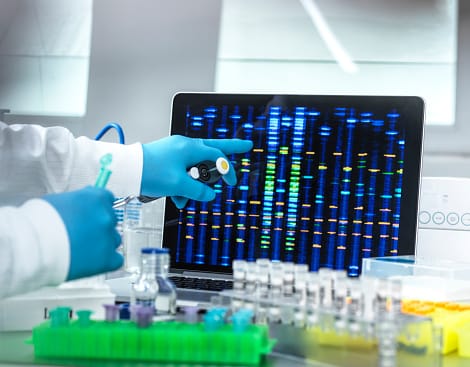Learn more about DNA testing and how it can help you find the best treatment for you. According to Johns Hopkins Medicine, nearly 10% of all American adults will suffer from a depressive disorder at some point in their life. Characterized by feelings of sadness and hopelessness, depression is a serious mood disorder that can negatively impact all areas of life. But how exactly do doctors identify this disorder? In other words, how do they come to a depression diagnosis?
Because it largely affects your mental health, getting diagnosed with depression isn’t as simple as getting diagnosed with a physical condition (such as diabetes or heart disease). Doctors can’t just identify depression based on a blood test — rather, they have to ask a series of questions and come to a conclusion based on your answers. Here’s a closer look at how to diagnose depression, as well as the different treatments available.
What Is Depression?
Before we examine how to get diagnosed with depression, it’s important to review what depression is. Put simply, depression is a serious mood disorder that affects your feelings, thoughts, and decisions. There are several different types of depression, such as:
- Major Depressive Disorder: This type of depression is short-term but intense.
- Persistent Depressive Disorder: Also known as dysthymia, this depression lasts for over two years.
- Seasonal Depression: This disorder is triggered by seasons (usually the winter).
- Postnatal Depression: This type of depression occurs in women that have recently given birth.
- Psychotic Depression: A severe disorder, psychotic depression may come with hallucinations and delusions.
Sometimes, depression might be caused by a certain event, such as the loss of a loved one — in other cases, it may arise due to general hopelessness about everyday life.
No matter the reason, it’s important that you receive treatment if you are dealing with depression. When left untreated, depression can worsen and cause you to lose interest in all aspects of life, from your job and relationship to your personal goals and ambitions. To receive treatment, your doctor must first come to a depression diagnosis.
How Is Depression Diagnosed?
The sad truth is, approximately 50% of people that have depression don’t receive a proper diagnosis or get treatment. Because depression can be dangerous when left untreated, it’s essential that you talk to a doctor if you experience any signs of the disorder.
In the past, doctors tended to lump all mood disorders together under the umbrella term, “depression.” Nowadays, people are receiving more precise diagnoses that pinpoint the exact type of depression they have. An accurate depression diagnosis increases the likelihood of receiving a more effective treatment, which is essential to overcoming depression. Here are some of the most commonly asked questions when it comes to diagnosing depression.
What Symptoms Do Doctors Look For?
The different types of depression often have an overlap of symptoms. Thus, if you suspect you have the disorder, your doctor may start with a generic depression symptoms test. Signs they may look for include:
- Poor mood and low energy levels
- Loss of interest in previously enjoyable activities
- Insomnia or excessive sleep
- Feelings of hopelessness
- Major weight change
- Difficulty concentrating
- Suicidal thoughts
If your doctor concludes you have depression, they might choose to conduct a more specific assessment to better understand the severity.
Which Assessment Finding is Associated With Depression?
There are several different assessment tools available for diagnosing depression. Each one comes with its own series of questions, as well as a scale used to measure the assessment findings and determine the type and extent of depression. Some common assessment tools include:
- Beck Depression Inventory (BDI): The BDI comes with 21 questions in a multiple-choice format and is often used to measure the severity of depression. It is widely used and can be taken online by anyone.
- Center for Epidemiologic Studies Depression Scale (CES-D): The CES-D features 20 questions and measures depression on a 4-point scale. It is sometimes used as a major depression test, as it is helpful in diagnosing major depressive disorder.
- Hamilton Depression Rating Scale (HAM-D): The HAM-D measures depression at three different points: before, during, and after treatment. This test is only available to healthcare professionals.
Assessment tools aren’t just helpful in determining the type of depression you have — they also provide insight into the extent of your depression, which influences the type of medication and dosage you receive.
Do I Need To Take Lab Tests?
Oftentimes, a depression diagnosis can be reached through assessment tools and verbal discussions. However, in some cases, your doctor may order lab tests to ensure that your depression is not a product of a medication, infection, virus, or vitamin deficiency. This is most commonly done if you are also experiencing physical symptoms, such as:
- Back and joint pain
- Headaches
- Digestion problems
- Sleep issues
- Poor motor function
After reviewing your medications and ordering lab tests, your doctor can determine whether you are suffering from a depressive disorder or whether your depression is simply a side effect of another issue.
Is There Anything I Can Do To Help Get An Accurate Diagnosis of Depression?
If you suspect you have depression, you can help your doctor achieve an accurate diagnosis by giving them as much information as possible. This includes:
- Any symptoms you have
- Current stressors in your life
- Medications you’re taking (or have taken in the past)
- Lifestyle habits (diet and exercise habits, alcohol and drug consumption)
- Whether you have a family history of depression
Ideally, your doctor can use the information you give them to reach an accurate diagnosis and prescribe the proper treatment.
What Treatment Is Available For Depression?
While the effects of depression may sound overwhelming, the good news is, the disorder can be treated. Most doctors will suggest a combination of the following:
- Counseling
- Medication
During counseling, patients discuss their feelings with a professional who helps them change their thinking and behavioral patterns. In some cases, such as when depression is caused by a singular event, counseling can be a sufficient treatment plan in itself. However, most doctors will also recommend a medication type known as antidepressants.
By physically changing parts of your brain, antidepressants can help decrease the symptoms of depression. They work by balancing chemicals called neurotransmitters, which are responsible for your emotions and mood. More specifically, they change your dopamine, norepinephrine, and serotonin levels. Similar to how there are different types of depression, there are different types of antidepressants available.
What Types of Antidepressants Are There?
Antidepressants can be divided into five different classes. While they are all known to be effective in reducing depression symptoms, each class works in its own unique way. They include:
- Selective serotonin reuptake inhibitors (SSRIs): SSRIs prevent the absorption of serotonin.
- Serotonin and norepinephrine reuptake inhibitors (SNRIs): SNRIs limit the absorption of serotonin and norepinephrine.
- Tricyclic antidepressants (TCAs): TSAs prevent the absorption of three neurotransmitters: serotonin, norepinephrine, and acetylcholine.
- Monoamine oxidase inhibitors (MAOIs): MAOIs make neurotransmitters more accessible by interfering with the function of an enzyme called monoamine.
- Atypical antidepressants: Atypical antidepressants don’t fit into any of the above classes. They affect neurotransmitters in their own unique ways.
Each class of antidepressants comes with a number of brands — for instance, brand names Zoloft, Prozac, Celexa, and Lexapro are all different types of SSRIs. Considering that there are so many different options to choose from, you might be wondering: how do doctors choose which one to prescribe?
How Do Doctors Choose A Treatment?
Once your doctor reaches a diagnosis of depression, they will most likely prescribe an antidepressant as part of your treatment. To choose one, they’ll usually ask about the following:
- Your symptoms: Some antidepressant medications may be more suitable for your symptoms than others. For example, the SSRI amitriptyline can assist with headaches.
- Your lifestyle: Your lifestyle choices can help guide which antidepressant is best for you. For example, the atypical antidepressant Wellbutrin has been proven to help with both depression and smoking habits, making it popular among smokers struggling with depression.
- Underlying medical conditions: Some antidepressants can interfere with other medications. By learning about your current medications and any underlying conditions, your doctor can help prevent this from happening.
- Family history: If you have a relative that is on an antidepressant medication (particularly a parent or sibling) then that medication may also work well for you.
- Pregnancy: Certain medications may not be safe for people that are pregnant or breastfeeding.
While your doctor will do their best to prescribe a medication that works for you, there’s no guarantee that you won’t experience side effects as a new drug enters your system.
What Side Effects Do Antidepressants Have?
When you get started with a new antidepressant, it’s normal to experience some side effects. These may include:
- Nausea
- Dizziness
- Headaches
- Fatigue
- Stomach problems
- Trouble sleeping
- Weight gain
If your antidepressant is effective, these symptoms should lessen or go away after a short period of time. However, in some cases, they may escalate and defeat the purpose of treatment entirely. It’s important to be able to recognize the signs of an ineffective antidepressant medication so that you can request a new medication.
How To Tell If My Antidepressants Are Working?
To overcome depression, you need to use a reliable antidepressant. These signs can help identify whether you need to try a new medication:
- You experience debilitating side effects
- You only experience temporary relief
- Your mood doesn’t improve
- Your depression gets worse
The key indication that your antidepressant isn’t working is if your side effects are overwhelming. In other words, the side effects of medication shouldn’t be more harmful than the condition itself. Other signs include your condition not improving or worsening — antidepressant medication should make you feel better, not worse.
If you suspect your medication isn’t working, your doctor will try to find a new one. This usually involves a game of trial and error, in which your doctor ties out different antidepressants until they find one that works for you. Although they may try to make educated guesses when prescribing a new drug, this process can be both time-consuming and taxing on your body.
The more antidepressants you try, the higher your chance of experiencing painful side effects. If you think this trial and process is off-putting, you’re not alone — as mentioned earlier, over half of the people that have depression don’t end up getting the treatment they need. Fortunately, there is another solution available: DNA testing.
What Is DNA Testing?
DNA has always given us valuable information about our bodies. It dictates aspects of our appearance, personality, and health — and now, it can be used to predict our response to certain medications.
Each DNA molecule contains genes that have their own unique genetic sequences. One of the many functions of genes is producing enzymes that are responsible for metabolizing, or breaking down, medications. By examining gene sequences, DNA testing can find variations that might interfere with the ability to metabolize drugs. This type of testing focuses specifically on an enzyme family called cytochrome P450 (CYP450), which includes the following:
- CYP2C9
- CYP2C19
- CYP2D6
Together, the CYP450 family is responsible for the metabolism of over 70% of clinically used drugs, including antidepressants like Prozac, Luvox, and Zoloft.
What Can DNA Testing Tell Me?
Put simply, DNA testing can be used to predict how your body will react to certain medications. With this information, you can skip much of the “trial and error” process by eliminating drugs that are projected to cause a negative reaction. Generally, your metabolism function will be placed in one of the following categories:
- Poor
- Intermediate
- Normal
- Rapid
Say your genetic test reveals that your CYP2D6 enzyme (which breaks down drugs like Prozac) has a poor metabolism rate. This suggests that if you take Prozac, your body will be unable to break it down in a specific timeframe, which means the drug is left in your system longer than normal. This usually results in adverse effects.
On the flip side, say your test reveals that your CYP2D6 enzyme metabolizes drugs too rapidly. Thus, if you take Prozac, your body will break the drug down too fast, rendering it ineffective. Either way, you can eliminate Prozac from your list of potential medications.
In addition to telling you whether a medication will be ineffective or cause side effects, genetic testing can help dictate what dosage you need. For example, if one of your enzymes has an intermediate metabolism rate, you can still take a medication that is broken down by that enzyme — you might just need a higher dosage.
Should I Get A DNA Test If I'm Diagnosed With Depression?
If you’re worried about experiencing medication side effects, then you should consider getting a DNA test to predict your body’s response to antidepressants. Other reasons you may want to try out genetic testing include the following:
- You think you have depression but haven’t received a diagnosis: You don’t need to have an official depression diagnosis to be suffering from depression. If you recognize symptoms of the disorder, it’s important to talk to your doctor and get help. You may also want to get a DNA test to prepare for future treatment.
- You have problems with your current medication: As mentioned earlier, it’s possible that your doctor prescribes a medication that’s either ineffective or causing painful side effects. Either way, DNA testing can help you find a new medication that’s better suited for your body.
- You’ve had problems with past medications: If you have struggled with adverse effects in the past, then you may have a genetic variation that affects your ability to metabolize certain drugs. DNA testing can help you identify those variations and optimize your treatment plan.
- You have family members that have struggled with medication: Oftentimes, genetic variations are passed down from our parents. If you have close relatives that report experiencing adverse effects when taking a new medication, then you might want to receive a DNA test for yourself.
- You have a medical condition other than depression: Sometimes, your genes can break down a certain medication easily but suddenly struggle when that medication is combined with another drug. To reduce the risk of two drugs clashing, you should consider getting a DNA test if you plan on taking multiple medications.
At the end of the day, anyone can benefit from genetic testing. Being aware of what your body can — or cannot — handle is essential to finding the right treatment for almost any medical condition.
Where Can I Get A Genetic Test?
Now that you understand the value of DNA testing, you may be wondering: where can I get one? At ClarityX, we provide Mindwell a test that reports your response to over 130+ psychiatric medications including some of the most commonly used antidepressants, including SSRIs and SSNRIs. Not only can ClarityX tell you which medications will work best for you, and the test also provides insight into the following:
- Whether you need a dosage adjustment
- Which drugs have an increased risk of unwanted side effects
- How certain medications will interact with one another
Our test is both quick and simple — all it requires is a saliva sample, which you can collect yourself from the comfort of your own home. After a short waiting period of 7 to 10 days, we will send a personalized report to both you and your primary care physician. Learn more by getting a DNA test today!





